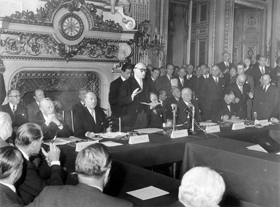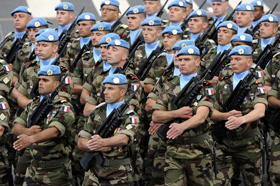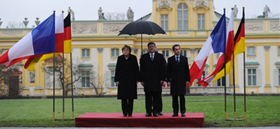En Route to European Defense
In
Login if you are already registered
(no votes) |
(0 votes) |
PhD in Economics, Head of the European Security Department RAS Institute of Europe
Although the EU agenda is strained and dominated by crisis-related issues, Euro-defense has lately become a staple issue in European politics. However, the very idea seems vague, as it is not yet clear whether it means establishing a European military force, as had been planned after WW2, or whether it is an amorphous development from the Common Security and Defense Policy (CSDP). Why is this sensitive question, which has traditionally divided the EU into opponents and proponents of defense integration (the Europeanists and Atlanticists), back on the agenda?
Although the EU agenda is strained and dominated by crisis-related issues, Euro-defense has lately become a staple issue in European politics. However, the very idea seems vague, as it is not yet clear whether it means establishing a European military force, as had been planned after WW2, or whether it is an amorphous development from the Common Security and Defense Policy (CSDP). Why is this sensitive question, which has traditionally divided the EU into opponents and proponents of defense integration (the Europeanists and Atlanticists), back on the agenda?
Some, for example Great Britain, still regard Euro-defense as inherently impractical, while others, including the Weimar Group, view it as a precondition for EU viability and something that must become a reality. For some Europeans, the Libyan crisis is obvious evidence of united Europe’s political impotence, while for others it is a bitter lesson and signal for action. Does European defense have a present, let alone a future? Will the project form a nucleus for a modernized European Union or highlight new faults and provoke internal disputes? As yet, there are no clear answers to these questions, but these Euro-defense dilemmas cannot be ignored, as they constitute a significant factor in European and international politics.
The Origins of European Defense

In May 1952, Belgium, Italy, Luxembourg,
the Netherlands, France and the Federal
Republic of Germany signed the European
Defense Community (EDC) Treaty
In May 1952, Belgium, Italy, Luxembourg, the Netherlands, France and the Federal Republic of Germany signed the European Defense Community (EDC) Treaty, intending to form an integrated European military force. But in 1954, the French National Assembly declined to ratify it, and collective defense functions were delegated to NATO, virtually killing the West European project. It was only years later, in 1992, that the Maastricht Treaty not only established the European Union but also extended the CSDP to all aspects of EU security, including the development of a common defense policy. Thus, the European intention to acquire a military-political dimension of its own, seemingly buried during the Cold War, found both a new life and a basis in law, as EU countries agreed on a common defense policy, "which might in time lead to a common defense" [1].
The Treaty of Lisbon, effective since December 1, 2009, outlines the idea more clearly: the CSDP "will lead to a common defense, when the European Council, acting unanimously, so decides" [2]. For a long time, unity on European defense had been close to naught, to say nothing of the failure to establish a genuine security and defense alliance. But recently, the subject rose again, phrased in terms of a "European defense renaissance," symbolized by the Phoenix [3].
First, the political framework underpinning European defense rests on a solid practical foundation. The EU has built relatively effective tools under the CSDP that form part of the Common Foreign and Security Policy (CFSP). The European Security and Defense Policy (ESDP), now the CSDP, was given new impetus after France and Great Britain signed the Saint-Malo Declaration in December 1988, which included provisions on establishing joint operational potential that laid the basis for the European Council’s decisions in Cologne in 1999. Despite the low chances for achieving a full-fledged defense union in the near future, the EU has been consistently advancing toward the formation of joint operational potential under the Saint-Malo Process. The EU possesses legislation that can determine its vector, i.e. common defense, in institutions and mechanisms under the CFSP/CSDP. The Europeans have initiated and executed over two dozen peacemaking operations, some military, across three continents, through multinational European tactical Battlegroups.

Peacekeepers from the United Nations Interim
Force in Lebanon (UNIFIL) (In French : FINUL)
take part in the annual Bastille Day military
parade on the Champs-Elysees in Paris
July 14, 2012
Hence, the EU set out to generate a capacity for self-contained peacemaking operations, known as the Petersberg Tasks. To this end, Headline Goal 2010 was adopted to create a military crisis management potential and fortify the related civilian program. Now that the programs are largely complete, other issues come to the fore, i.e. the coordinates and aims for amalgamating defense efforts. The European Security Strategy, 2003 [4] is now obsolete and does not answer these key issues, due to major geopolitical changes, emerging threats and challenges, and also because of the past decade’s noticeable changes in the EU [5]. Unsurprisingly, many European politicians and experts insist on a strategy review [6].
European Defense: Fresh Initiatives
Back in December 2010, foreign and defense ministers from Germany, France and Poland, a grouping known as the Weimar Triangle, attempted to streamline European defense policy, which, as Polish Foreign Minister Radoslaw Sikorski said, was to become" an important dimension of European integration". In a letter to Catherine Ashton, the EU High Representative for Foreign Affairs and Security Policy [7], the three states said they deemed it essential to boost the ESDP and develop "more robust and effective tools to allow for coherent European action" [8].
Propped up by Italy and Spain during the Polish EU presidency in the second half of 2011, the Weimar Initiative suggests, among other things, establishing permanent structures for operation planning and control.
From the outset, Great Britain harshly opposed the creation of permanent European HQ structures, refusing to finance the unquestionably expensive project that would duplicate NATO. Foreign Secretary William Hague was blunt: "I have made very clear that the United Kingdom will not agree to a permanent operational HQ. We will not agree to it now and we will not agree to it in the future. That is a red line" [9]. Having initiated building up the EU’s operational potential, jointly with Paris, in the late 1990s, London believes in raising existing forces’ efficiency and in the political will for their use. However, the Weimar Group continued gathering support for its project, hinting that the Treaty of Lisbon allows its implementation by a group of EU countries within the framework of advanced cooperation without Great Britain. As a result, although some European countries remain skeptical about defense integration, only Great Britain is rigidly opposed. Nevertheless, London concedes that "the EU should be more strategic in its approach to conflict response," of course bearing its own strategic aims in mind [10].
In September 2012, the establishment of a single European force was outlined in a project for radical, and essentially federalist, EU reforms proposed by the Future of Europe Group of eleven Foreign Ministers (Austria, Belgium, Germany, Denmark, Spain, Italy, Luxembourg, the Netherlands, Poland, Portugal and France) [11]. Although the Group was not unanimous about setting building up the European army as a long-term goal, its members agreed that joint efforts are needed to create a common armaments market, that the policy should be more ambitious than merely the association and joint use of resources, and that the Treaty of Lisbon’s provisions on "permanent structured cooperation" should be put into practice.
Traditionally in the vanguard for European military autonomy, Paris explicitly confirmed the new French government’s readiness to advance European defense, which was exactly the signal Defense Minister Jean-Yves Le Drian conveyed to his colleagues in Brussels on September 3, 2012 [12]. France has decided to incorporate the European dimension in developing the new White Paper on National Defense. Finally, aware of the ever more acute choices the EU faces, European Council President Herman Van Rompuy set a Council session on the defense issue for late 2013 [13]. This approach steps up the debate and makes it more structured ahead of the planned defense summit. According to Rompuy, in order to activate summit preparations, CSDP development became the central issue on the European Council’s agenda for December 13-14, 2012 [14].
Thus, in recent months, the issue of European defense has been gaining momentum, largely due to the vigor of a stable and influential group of countries within the EU, that promote the CSDP’s qualitative strengthening and the further development of European defense potential. Importantly, the group is led by the Weimar Triangle Plus, the participants in which are viewed by Le Drian as "key for European defense". At the meeting that followed the European Council’s December 15 Brussels session, the group's foreign ministers adopted a declaration in favor of “an ambitious European policy in the field of security and defense," stating that they would like to see "more of Europe" in the defense area [15].
Due to its configuration, the Weimar Group is in a position to tip the political balance within the European Union. Including Warsaw in the Berlin-Paris link reinforces this engine of integration that is driving Europe toward federalization. Replacing the Atlantic bias of Sarkozy whose practical contribution to European defense was minimal, the new European accents in the French security policy see Paris move with greater confidence and determination along the chosen track. Even the Franco-British agreement on defense cooperation (in force since July 1, 2011) [16], officially interpreted as the foundations for advancing the European security dimension, was seen by many as Sarkozy's Atlantic drift and the loss of a key player.
Current Motivation
The drive toward European integration on security and defense has a clearly rational basis. In order to be successful, the EU must develop into a self-sufficient and influential international actor with an independent security policy that relies on its own resources, including military and civilian potential. This motivation remains the key shaper of the CFSP/CSDP, and of late has gained ground due to several significant factors.
First there are the lessons from the Arab Spring. The EU's performance was obviously weak, considerably devaluing the CSDP. Brussels failed to accomplish the mission that it had spent so long preparing for, i.e. taking up responsibility for settling crises threatening the security of Europe and primarily the EU itself.
On the one hand, just as had been the case 20 years previously in Yugoslavia, Europe’s potential failed to match the operational needs. Hence, Europe had to appeal to Washington and use NATO rather than the CSDP or Berlin Plus mechanisms, i.e. a EU-NATO package agreement allowing the EU to use NATO resources when the United States (and NATO) were unwilling or unable to participate. On the other, the Libyan crisis has shown that the European Union lacks the political will and unity to use its joint, albeit limited, operational potential. Under the pretext of excessive risks, the EU even failed to agree on an ESDP operation to support humanitarian missions after NATO’s military campaign in Libya.

The Executive Director of the European Defence
Agency, Claude-France Arnould
In other words, the CSDP’s deficiencies get in the way of a successful common foreign policy, particularly on a global scale, whereas insufficient unity prevents the creation of efficient tools. Further, even where the tools are available, their use is highly problematic. Clearly demonstrated by the Libyan crisis, the CSDP’s drawbacks have naturally fuelled Eurosceptic sentiment. At the same time, the weakness and disunity that have been revealed have bolstered the strategic drive toward a stronger common defense policy and potential.
"Co-operation is no longer an option, it is a matter of necessity, and even a matter of urgency", concluded Claude-France Arnould, European Defense Agency head, speaking about the EU’s current stance on CSDP. Another major reason in favor of European defense is continuing dependence on the United States, whose interests have been steadily shifting to Asia-Pacific, primarily toward China.
Second, the broader EU crisis has boosted the search for a practical model for a new strategy. The move toward federalization and stronger community-based institutions, which had previously failed to find adequate backing, is now largely seen as the only way to overcome the internal crisis and preserve the Union. Even London's refusal to follow suit can no longer be regarded as unacceptably damaging if the goal is the EU’s survival. Understandably, the new philosophy of development and institutional change is creating a new reference system, in which the defense vector has greater prominence. Fiscal union "now appears to be the only way to save the euro" and will require the relinquishing of national sovereignties to provide "the potential foundations for a collective security policy" [17]. In this area, hitherto dominated by the balance of forces between the United Kingdom, on the one hand, and pro-Europeans headed by France and Germany, on the other, the British opposition is now perceived as inevitable, but not as an insurmountable obstacle. A year ago, London virtually choked the Weimar Group proposals on joint HQ structures for European operations. Now the situation has drastically changed. French Foreign Minister Laurent Fabius underlines that the Group's plan for EU defense reform is open to all member-states, including Britain [18]. Proponents of Euro-defense are becoming more insistent that the Lisbon framework is applied for CSDP purposes, including the mechanisms for advanced cooperation among participants. The Group's report on the EU’s future underlines that the European Union’s emergence as a global actor requires a revision of the CFSP’s decision-making process, an expansion of the majority vote rule and the constructive abstention practice, at least to ensure that no country can block integration initiatives [19]. In the current political context, the focus is essentially on British opposition.
Third, the global and European crises have sharpened the problem of resources. Defense budgets in almost all EU countries are being cut, potentially to levels critical both for their military forces and industries that face losing government contracts. In 2009-2012, military budgets in the EDA’s 26 members fell by 30 billion euro [20]. Hence, optimizing resources within the "more for less" framework and strengthening Europe’s defense technology and industry markets now seem critically important for the Euro-defense project. Since the degradation of national defense sectors poses an internal threat to European states’ security systems and undermines their economic and technology base, there is virtually no choice other than having a self-contained European defense market working to purely European decisions. Swedish General Håkan Syrén, ex-Chairman of the European Union Military Committee, suggested that member countries devote five percent of their defense budgets to joint EU spending.
Paradoxically, the CSDP’s weakness makes European countries funnel their resources to NATO, expanding U.S. military, economic and technological dominance and further curtailing EU potential. Every time Washington persuades Brussels to take on more responsibility and share the burden within the alliance, the opposite occurs: Europe indirectly finances the growth of American defense output and exports, to the detriment of its own deficits and Euro-defense’s resource base. Righting this imbalance seems impossible without internal consolidation within the EU military industry. At the same time, despite the economic crisis, there has been an upswing in the global arms trade (up to 85.3 billion dollars, almost double the 2010 level) and the U.S. share has grown to 80 percent, which serves as a potent stimulus for defense integration in the EU [21].
Thus, the Euro-defense project is no longer a largely political affair as it is acquiring powerful financial and economic motivation. "In the face of this gloomy situation, talking about military cooperation in Europe, albeit necessary, seems by now nearly obsolete. Member states should think bigger and dare to take the path of ‘defense federalism’. Only by embracing this radical plan would they be able to rationalize and, most of all, update their military forces to the challenges posed by today’s reality " [22].
European Defense, European Forces: Vague Outlook
What kind of future is in store for Europe’s Phoenix? The answer lies in the broader context, i.e. whether the EU crisis results in Europe's post-modern renaissance. If the crisis veers out of control and the Eurozone breaks up, then the Euro-defense project will die a natural death. But if the situation improves, the EU’s internal bonds solidify and the advance toward a political union continues, it will inevitably incorporate a defense dimension. Progress toward political union will shape the prospects for military and political consolidation, up to and the formation of European military forces. While official use of the term European Army would previously have compromised the idea of EU defense autonomy and provoke stronger opposition, currently the talk of a future European Army will only improve the Euro-defense project’s choices. Anyway, the prospect seems to extend beyond the foreseeable horizon. To this end, the designation of a future strategic goal and raising the bar of European integration in the defense and security arena do not mean either implementation or a roadmap, but rather assessing the capacity and probability of Europe moving in this direction. "The idea of “cooperation” is far different to that of “federalism”, and that applies to the military field too. Therefore, it is not taken for granted that behind the ambitious plans backed by many EU countries lies a concrete will to engage into a full-fledged integration on defense " [23]. On the whole, motivation is growing alongside broader political capabilities. But forecasting the implementation of a strategy based on Bernstein's principle “the movement is everything, the final goal is nothing” seems less than feasible. Moreover, in many cases the same factors both promote and constrain the concept of Euro-defense. So, "the European defense industry has struggled for 20 years with the need to restructure and adapt to global markets, but the effort has been systematically torpedoed by narrow-minded national interests" [24]. Clearly, despite the current growing need for the European defense sector’s consolidation and stronger political support for this process, overcoming protectionism still seems a daunting task, as is exemplified by the failed merger of European aerospace corporation EADS and British defense giant BAE. According to Deputy Secretary-General of the European External Action Service, Ambassador Maciej Popowski, "the main challenge is to link pooling and sharing as a European initiative with the national defence planning processes".
It is not clear whether or not the Euro-defense project could be implemented by a limited group of EU states, particularly without the involvement of Great Britain. If the scenario succeeds, whom and whose interests will the European Army defend – those nations involved in Euro-defense or signatories to the Treaty on European Union? Movement along this track should imply a review of the Transatlantic relationship. The transformation of NATO into a Euro-Atlantic Alliance through the formation of a muscular and consolidated European basis seems most likely. But is such a role attainable for Europe, as its capabilities and resources seem limited?
Given its interest in strategic partnership with the EU, as well as greater independence and responsibility in the European security system, Russia should consider the formation of a tripartite relationship with the West, i.e. EU-Russia-United States. In order to emerge as an influential international actor, the EU would have to augment its soft power with tough military-political tools, while not making it an armed enemy for Russia or other parties. Acquiring a defense dimension should not alter the EU's overall political philosophy, which implies consolidation on the basis of common democratic values and outward projection in the form of soft power. On the contrary, the EU's greater independence should strengthen the non-confrontational fundamentals of the pan-European security system. The EU's emergence from the United States’ shadow, and its unquestionable political, military and economic dominance, should make Europe more interested in cooperation with other countries, principally with Russia.
1. Treaty on European Union (1992). Article J.4 // Official Journal C 191 of 29 July 1992. № C. 191/59.
2. Consolidated Version of the Treaty on European Union. Article 42 // Official Journal of the European Union C 83/13, 30.3.2010. C. 83/38.
3. Jehin,Olivier. Rebirth of European defence is becoming possible // Europe Diplomacy and Defence, № 555, 25 October 2012. – P. 1.
4. A secure Europe in a better world European Security Strategy. Brussels, 12 September 2003.
5. See: The European Security Strategy: Reinvigorate, Revise or Reinvent? // UI Occasional Papers. 2011, № 7.
6. Final Report of the Future of Europe Group of the Foreign Ministers of Austria, Belgium, Denmark, France, Italy, Germany, Luxembourg, the Netherlands, Poland, Portugal and Spain. 17 September 2012. P. 7.
7. Letter from the Weimar Triangle to the High Representative, 6 December 2010.
8. Ibid. – P. 4.
9. Bulletin Quotidien Europe. № 10421, 19.07.11. – P. 6.
10. EU Common Security and Defence Policy: The UK Perspective. Speaker: David Lidington. 27 June 2012 // Official homepage of British Foreign and Commonwealth Office (FCO).
11. Final Report of the Future of Europe Group of the Foreign Ministers. – P. 7.
12. Europe Diplomacy and Defence, № 539, 4 September 2012. – P. 1.
13. Europe Diplomacy and Defence, № 555, 25 October 2012. – P. 1.
14. Remarks by President Herman Van Rompuy following the European Council. Brussels, 14 December 2012. EUCO 237/12. PRESSE 533. PR PCE 200.
15. Meeting of the Foreign Affairs Ministers and Ministers of Defence of France, Germany, Italy, Poland and Spain. Paris, 15 November 2012.
16. Treaty between the United Kingdom of Great Britain and Northern Ireland and the French Republic for Defence and Security Co-operation, London, 2 November 2010. 16.11.12
17. Majors, Stephen. Europe's debt crisis: A nudge toward a common security policy // Foreign Policy, October 26, 2012.
18. Rettman, Andrew. Five EU countries call for new military 'structure' // EUobserver.com.
19. Final Report of the Future of Europe Group of the Foreign Ministers. – P. 7.
20. Europe Diplomacy and Defence, № 555, 25 October 2012. – P. 1.
21. Europe Diplomacy and Defence, № 538, 30 August 2012. – P. 2.
22. Molica, Francesco. Future options for European defense // Thenewfederalist.eu, Friday 20 January 2012.
23. Ibid.
24. Guérot, Ulrike. The Continentalist: For EU, Peace Comes Without Strategy // World Politics Review, 15 Oct 2012.
(no votes) |
(0 votes) |





